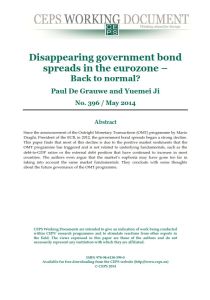Join getAbstract to access the summary!

Join getAbstract to access the summary!
Paul De Grauwe and Yuemei Ji
Disappearing Government Bond Spreads in the Eurozone
Back to Normal?
CEPS, 2014
What's inside?
Can the euro and the euro zone survive without democratic accountability?
Recommendation
Spreads on sovereign debt in 2014 are far more amenable to euro-zone governments than they were in 2010 to 2012, yet the finances of many of the peripheral members are far from healthy. The breathing space afforded by lower rates is largely due to intervention from the European Central Bank (ECB), whose actions have drawn sharp rebuke from some, particularly in Germany. getAbstract recommends this brief paper for its cogent analysis of the euro sovereign-debt markets, the opposition to ECB programs and the implications of political union on the future of the euro.
Summary
About the Authors
Paul De Grauwe is a professor at the London School of Economics. Yuemei Ji is a researcher at Brunel University.



















Comment on this summary